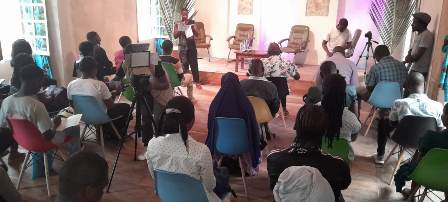Mozambique's Sebastião Coana opens 'Echoes of Earth' exhibition in Katara, Doha
Mozambique Island once again debates national socio-cultural cohesion

File photo: RM
National unity and the recovery of citizenship values once again received the attention of academics, artists, religious people, young university students and other interested parties last Thursday, February 27, in the city of Ilha de Moçambique, Nampula province. In a room of forty-five people, there was little time reserved for discussions, as those present were eager to contribute ideas with the ultimate goal of bringing peace using
culture to the country.
And it was along these lines that Filimone Meigos, renowned sociologist and director of the Higher Institute of Arts and Culture, IsArc, highlighted the importance of valuing “anonymous heroes” to safeguard the goal.
Meigos showed concern about the marked acculturation that can be seen in society due to the apparent inertia of the country’s political power, which can even include statues and names of streets and avenues in tribute to the colonizer.
“Here on the Island of Mozambique, there is even a statue of Vasco da Gama. What inspiring story did Gama bring to the country and can our children use as a reference?” he asked.
For Wilson Nicaquela, cultural researcher and director of the Faculty of Social and Human Sciences at Lúrio University, located on the Island of Mozambique, he saw the recovery of Mozambican values as imperative and highlighted that the institution he directs has stood out in this chapter by bringing together young people from various corners of the country and sharing habits and customs that add to citizenship.
The writer and university professor Arsénio Cuco was invited to the panel to discuss tribalism and regionalism and defend a dialogue without taboos. He called for reconciliation among Mozambicans and everyone’s involvement in a Mozambique that wants to be prosperous.
Spectators welcomed the initiative and were unanimous in considering culture as a fundamental element in the construction of citizenship, and that periodic festivals to exalt local culture should be promoted.
The event’s co-organizer, Elarte, through executive director Nilza Nhamuchua, said that the event served as a starting point to discuss and perhaps rethink the Mozambique we want, without belittling the culture of others.












Leave a Reply
Be the First to Comment!
You must be logged in to post a comment.
You must be logged in to post a comment.